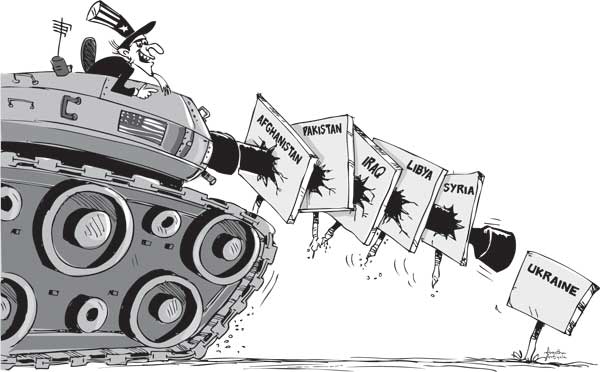Reply To:
Name - Reply Comment
Last Updated : 2024-04-27 08:30:00

.jpg) Hundreds, if not thousands, of civilian deaths apart, the Obama administration’s drone attacks are, by all means, extrajudicial killings, which international law squarely condemns because such killings are barbaric and in breach of the principles of natural justice. Yet the Harvard law lecturer in the White House has no qualms about extra judicial killing which he, as commander in chief, orders, monitors and acclaims as a success.
Hundreds, if not thousands, of civilian deaths apart, the Obama administration’s drone attacks are, by all means, extrajudicial killings, which international law squarely condemns because such killings are barbaric and in breach of the principles of natural justice. Yet the Harvard law lecturer in the White House has no qualms about extra judicial killing which he, as commander in chief, orders, monitors and acclaims as a success. .jpg) Let the Ukrainian crisis oscillate between war and peace; just rewind time or take a journey backward in the time machine. One may lose count of how many times powerful nations have violated the sovereignty of other nations. In this journey, one will see big-time rogue nations plundering the resources of the third world during the colonial era and justifying colonialism on the basis that the civilised were on the mission to civilise the uncivilised.
Let the Ukrainian crisis oscillate between war and peace; just rewind time or take a journey backward in the time machine. One may lose count of how many times powerful nations have violated the sovereignty of other nations. In this journey, one will see big-time rogue nations plundering the resources of the third world during the colonial era and justifying colonialism on the basis that the civilised were on the mission to civilise the uncivilised..jpg) The hypocrisy of the West knows no bounds and is blatantly evident in the ongoing Ukrainian crisis. How can the West denounce Russia for sending troops into Crimea when the West itself stands accused of illegally invading Iraq, Grenada and Panama and giving warped interpretations to -- or misinterpreting to its advantage -- UN resolutions to invade many other countries? No less a person than Kofi Annan, the United Nations Secretary General at the time the US launched its war on Iraq in 2003, described the Iraq invasion as illegal because it did not have the approval of the United Nations Security Council.
The hypocrisy of the West knows no bounds and is blatantly evident in the ongoing Ukrainian crisis. How can the West denounce Russia for sending troops into Crimea when the West itself stands accused of illegally invading Iraq, Grenada and Panama and giving warped interpretations to -- or misinterpreting to its advantage -- UN resolutions to invade many other countries? No less a person than Kofi Annan, the United Nations Secretary General at the time the US launched its war on Iraq in 2003, described the Iraq invasion as illegal because it did not have the approval of the United Nations Security Council..jpg)
.jpg) While hectic diplomatic efforts aimed at de-escalating the situation are taking place in key capitals of the world, Russia appears to be willing to give diplomacy a chance. With the situation in Ukraine being compared to the 1962 Cuban missile crisis which brought the world dangerously close to an all-out nuclear war, a solution through diplomacy is the only answer.
While hectic diplomatic efforts aimed at de-escalating the situation are taking place in key capitals of the world, Russia appears to be willing to give diplomacy a chance. With the situation in Ukraine being compared to the 1962 Cuban missile crisis which brought the world dangerously close to an all-out nuclear war, a solution through diplomacy is the only answer.
Add comment
Comments will be edited (grammar, spelling and slang) and authorized at the discretion of Daily Mirror online. The website also has the right not to publish selected comments.
Reply To:
Name - Reply Comment
US authorities are currently reviewing the manifest of every cargo aboard MV
On March 26, a couple arriving from Thailand was arrested with 88 live animal
According to villagers from Naula-Moragolla out of 105 families 80 can afford
Is the situation in Sri Lanka so grim that locals harbour hope that they coul

26 Apr 2024
26 Apr 2024